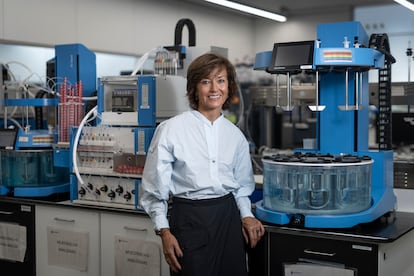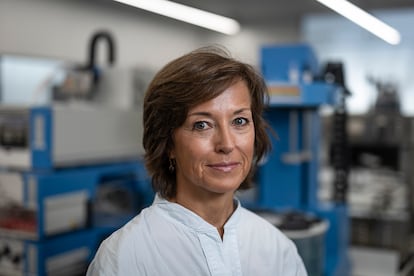Elisabeth Stampa: ‘Many drugs that used to be produced in Europe are now manufactured in Asia. This makes us vulnerable to shortages’
The president of Medicines for Europe considers that the supply of essential drugs is at risk if governments do not allow the price of cheap drugs to be revised in line with inflation

In December 2022, Europe ran out of pediatric antibiotics to cure the most common infections among the continent’s children. Unprecedented in the history of the European Union and unthinkable only a few months earlier, the situation had to be solved with imaginative measures such as splitting and crushing adult pills to adjust the doses for minors.
After the hardships experienced during the pandemic in which the EU wrestled with problems over essential drugs such as paracetamol, this was the definitive confirmation that the fragile supply chains in the pharmaceutical sector and the recurrent supply problems of certain molecules constitute a major problem for the health of EU citizens, despite the block being an industrial and scientific power and the world’s second-largest market for drugs.
The Spaniard Elisabeth Stampa, 56, knows the problem first-hand. A member of the board of directors of Medichem, one of Europe’s leading manufacturers of active ingredients, and president of Medicines for Europe — the European generic manufacturers’ association — for years she has been witnessing the continent’s loss of autonomy in the pharmaceutical sector and how Asia has monopolized the manufacture of most drugs. This was one of the main issues discussed at the Medicines for Europe Annual Conference, held in August in Dublin where this interview took place.
Question. After the pandemic, there were scares and antibiotic shortages during the winter of 2022-23. Have things improved at all?
Answer. In part, yes. The authorities have asked companies to be more prepared, and so companies have strengthened their supply chains and have geared up to take on a potential increase in production. But it is also true that this past winter there have not been as many infections, so demand [for drugs] has actually gone down. We still have to wait a while longer before we can be sure that the new measures have been successful.
Q. Is the European Union still vulnerable?
A. It is still heavily dependent on foreign production, mainly from Asia, and that makes us very vulnerable.
Q. Why?
A. For the past 20 years, European countries have been implementing a range of policies aimed at lowering the price of drugs [for the consumer], even those that were already cheap. The specific measures vary from country to country, but if we add to this our manufacturing costs, which are higher in Europe than in Southeast Asia, the result is that many drugs that have historically been produced in Europe are now manufactured over there. And this makes us vulnerable.
Q. Which costs are different?
A. Most of them: labor, materials, environmental legislation. Asia has also not suffered the energy price increases that Europe has experienced. If the ultimate objective is cost, it is practically impossible to compete with those countries.
Q. Is it possible to reverse this? There is now talk of reindustrializing Europe and recovering a certain strategic autonomy.
A. If there is political will, yes. There are different levers. A really important one would be to allow generic drug prices to be revised in line with inflation. If you launched a product at €3 10 years ago, you’d be lucky if it is still worth €3. And in Spain the average is closer to €1.5. But inflation has risen, some costs have skyrocketed, workers’ salaries have gone up, environmental legislation has become stricter, regulatory requirements have become stricter. A company in the food sector, for example, can pass these increases on to the consumer; we cannot.
Q. And so?
A. Well, margins disappear, companies stop producing drugs because it is no longer profitable for them, and where there used to be 10 or 15 companies manufacturing a drug, there will only be two or three. If one of them has a problem, the others are unable to cope with the increase in demand and we already have shortages. And if there is only one left, the problem is even greater.
Q. What is the impact of environmental legislation?
A. Environmental requirements in Europe are strict. Companies invest to reduce emissions and water consumption. We also invest to minimize waste, use fewer solvents and return cleaner water to the environment. All this requires major investments that have to be taken into account. And it is good that we are required to make them; it is a benefit for society as a whole and our environment. But asking for this without allowing us to pass on the cost is not always feasible.

Q. What is the European Union doing to address this issue?
A. The Commission published the list of Essential Medicines with more than 200 molecules at the end of 2023, and the specific objective of addressing the problems of shortages. On this list, the Critical Medicines Alliance has been established and work has already begun to see what measures can be put on the table for a report by the end of 2024 with proposals that the new European Commission will implement in its mandate.
Q. It is a first step...
A. Yes, and it is important. There is an awareness that the situation does not have easy solutions, but also a clear will to face the problem and ensure that the supply of these essential drugs is guaranteed and that we don’t suddenly realize that the active ingredient of the paracetamol we need in Europe stopped being produced here many years ago due to cost reasons, as happened during the pandemic.
Q. The EU’s other proposal to deal with supply problems was the New Pharmaceutical Strategy, whose approval was delayed and will now have to be taken up again by the new European executive. What is the situation on that?
A. The EU Parliament has defined its position, but this could now change, and the strategy must also be considered by the European Council and the member states. The important steps will probably be taken in the first half of 2025.
Q. What is the position of Medicines for Europe?
A. Our main objection is the Commission’s proposal to give 11 to 13 years of protection to new innovative medicines so that generic competition cannot emerge. This is the longest period of protection anywhere in the world. It is currently between eight and 10 in Spain, and in the U.S., it is five. We prefer 11 to five, but we still think it is too many.
Q. Why?
A. It hurts the generic industry, but I think it mainly hurts patients and healthcare systems. They will have to pay more for the drugs and, in some countries, the patient may not be able to access them.
Q. Another of the Commission’s proposals was to provide incentives for the development of new antibiotics.
A. It is good to give incentives and protect innovation, but we believe that the mechanism currently proposed can be improved on. The initial idea is that, if a pharmaceutical company launches a new antibiotic, it is given a voucher that allows it to extend the patent of any drug in its product range by one year, or even to transfer that voucher to another company. This can cost public health systems more than €1 billion a year, depending on the price of the drug, as well as the delay caused in the development of generics.
Q. What role does Spain play in the generic drug sector?
A. Spain is relevant at the volume level, but it has a serious problem at the price level. The fact that half of the generic drugs have to be sold at a price as low as €1.5 is a disincentive for them to be put on the market in Spain. In the end, there is the paradox that they are manufactured here, often to be exported to other countries where they pay more, such as the U.S.
Sign up for our weekly newsletter to get more English-language news coverage from EL PAÍS USA Edition
Tu suscripción se está usando en otro dispositivo
¿Quieres añadir otro usuario a tu suscripción?
Si continúas leyendo en este dispositivo, no se podrá leer en el otro.
FlechaTu suscripción se está usando en otro dispositivo y solo puedes acceder a EL PAÍS desde un dispositivo a la vez.
Si quieres compartir tu cuenta, cambia tu suscripción a la modalidad Premium, así podrás añadir otro usuario. Cada uno accederá con su propia cuenta de email, lo que os permitirá personalizar vuestra experiencia en EL PAÍS.
¿Tienes una suscripción de empresa? Accede aquí para contratar más cuentas.
En el caso de no saber quién está usando tu cuenta, te recomendamos cambiar tu contraseña aquí.
Si decides continuar compartiendo tu cuenta, este mensaje se mostrará en tu dispositivo y en el de la otra persona que está usando tu cuenta de forma indefinida, afectando a tu experiencia de lectura. Puedes consultar aquí los términos y condiciones de la suscripción digital.









































